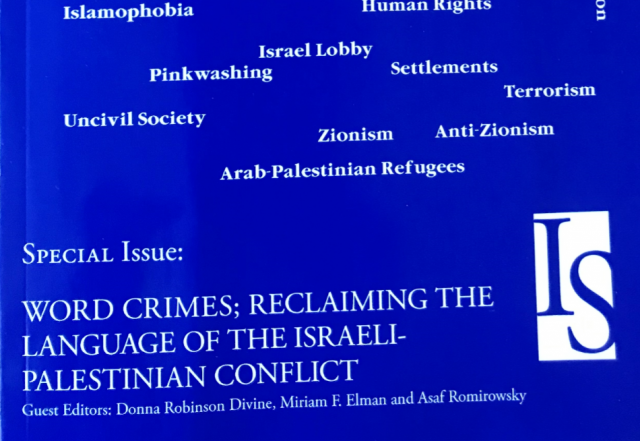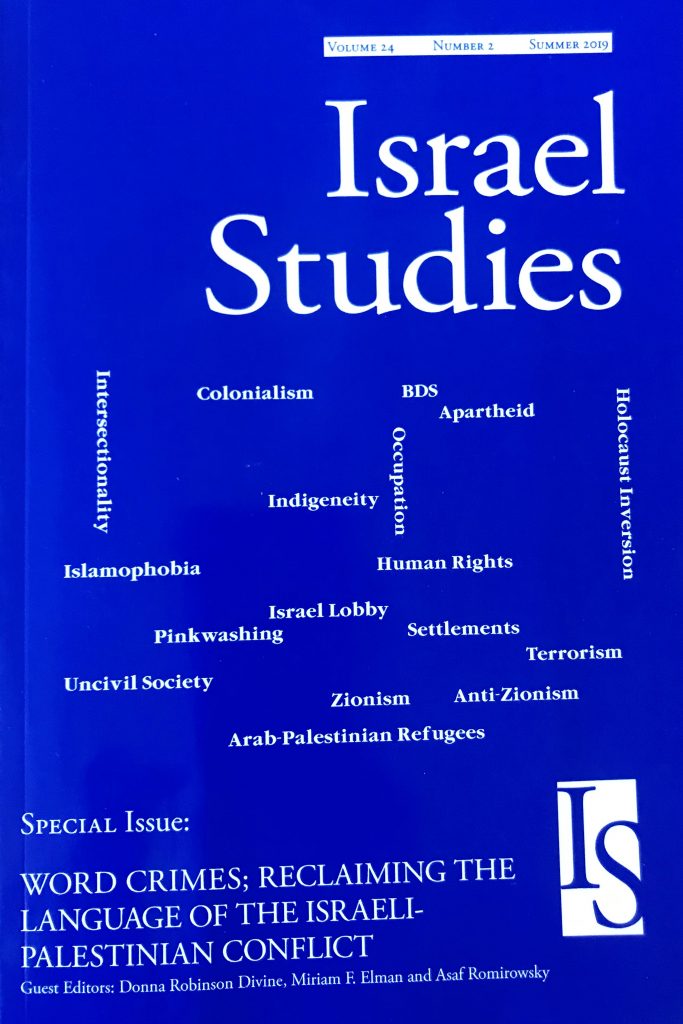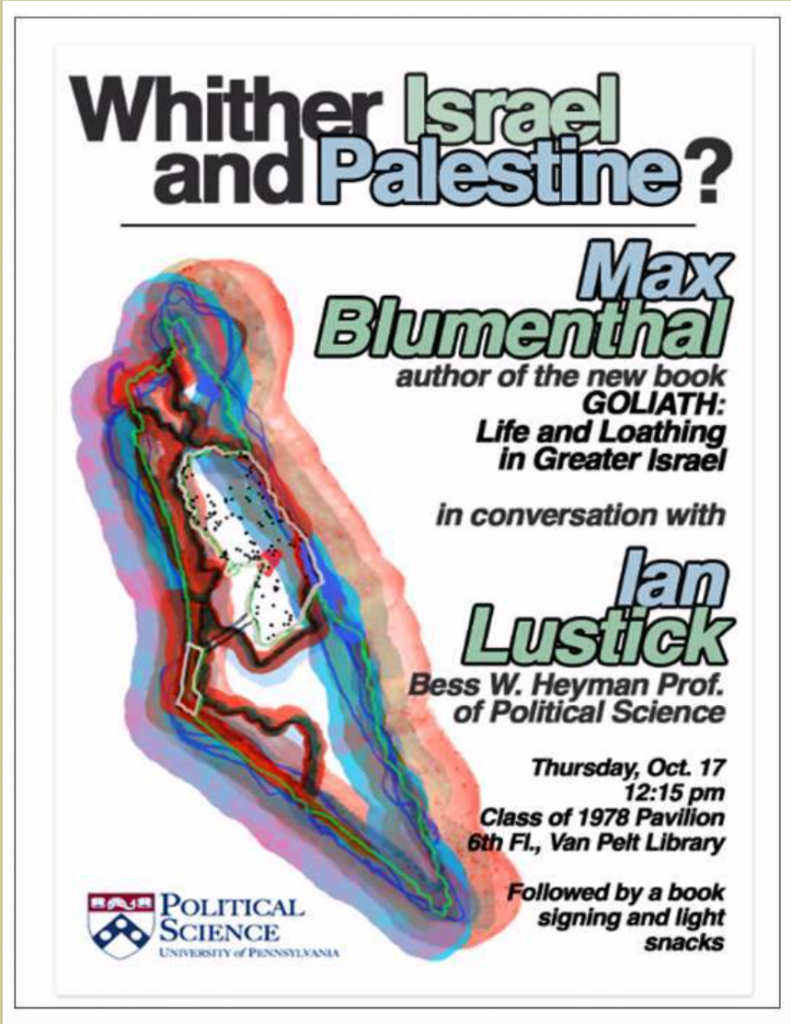Word Crimes: Left-wing Israel Studies faculty try to silence scholars deemed too pro-Israel
The backlash against the “Word Crimes” Special Issue of the Israel Studies Journal included demands for retraction, and a smear campaign against the authors.

A fierce backlash was perhaps all but inevitable when a recently published special issue of the academic journal Israel Studies provided a powerful counterpoint to the incessant delegitimization of the world’s only Jewish state.
Under the title “Word Crimes: Reclaiming the Language of the Israeli-Palestinian Conflict,” the volume (co-edited by Legal Insurrection contributor Professor Miriam Elman) examines the “academic jargon draped in scholarly prestige” that is used to imply “that Israel’s founding in 1948 is not settled history” but rather a “historical wrong” that can and should be righted according to Palestinian demands.
A Voice of Dissent In a Scholarly World Perverted by Israel Hatred
You can view the list of articles at the JSTOR website, but only two of the articles are available for free, Prof. Donna Robinson Divine, Reclaiming The Language of The Israeli-Palestinian Conflict (pdf.) and Prof. Miriam Elman, Postscript: BDS (pdf.):
The essays in this special edition of Israel Studies do not make for an easy read, but they are a necessary one. Taken collectively, they expose academic disciplines in which scholars have actually morphed into propagandists, in which lies and innuendo take the place of rigorous research designs, and where shoddy pseudo-academics cast Israel as a malign force trying to deliberately humiliate and “ghettoize Palestinians”. What we see is an abuse of language to defame a people—a wholesale re-description of history that has turned Arabs into innocent victims and Jews into guilty oppressors.18
This perversion of the academic discourse on the Israeli-Palestinian conflict necessitates a reclaiming of the topic’s language so that complex historical, legal, and political concepts—now merely used by anti-Israel scholar-activists as cudgels to wield against their Zionist colleagues—can once again generate meaningful discussion and rigorous theorizing. The anti-Zionist paradigm has gained a strong foothold in academia, where it fits well with the general trend to virtue signaling and to viewing the world in terms of absolute good and absolute evil. We harbor no illusions that a single collection of essays will lead to the widespread change we need. Nonetheless, we hope that our project will serve as a timely corrective and that it will help to restore a rigor and a richness to the study of the intractable Israeli-Palestinian conflict that both scholars and students deserve.
You might think that Israel Studies faculty would support Israel. But as with Jewish Studies, many of the faculty are leftists who support or at least are sympathetic to the anti-Israel boycott movement. Others are anti-Zionist. These anti-Israel Israel Studies faculty bring their politics not only into the classroom, but into their allegedly scholarly work.
In an academic environment dominated by anti-Israel narratives, the Special Issue amounted to a dissenting voice. That dissenting voice, apparently, could not be tolerated.
Since the journal is affiliated with the Association for Israel Studies, and since the critics of the “Word Crimes” issue include members of this group, it is noteworthy that the membership reportedly “spans the gamut of traditional Zionists to supporters of the international boycott movement [BDS] against Israel” – which presumably makes the group the only academic body that has members who would like to see the country they study eliminated.
The attacks on the Special Issue were made, among other places, in open letters to the Association for Israel Studies and Israel Studies Journal.
The reported leaders of the attacks on the Special Issue were Arie M. Dubnov, the Max Ticktin Chair of Israel Studies at George Washington University, and Ian S. Lustick, a professor of political science at the University of Pennsylvania.
Arie M. Dubnov
The perhaps sharpest criticism of the “Word Crimes” volume came from Dubnov of George Washington University, who, according to Haaretz, asserted that the special issue “appears designed to provide talking points for anti-BDS [i.e. the boycott, divestment and sanctions movement targeting Israel] and pro-‘hasbara’ [i.e. Israeli public diplomacy] efforts, and does not serve an academic purpose.” Haaretz further reported that Dubnov demanded the Special Issue be retracted:
Israel Studies is not the association’s official journal, but because some of its leading members were involved in producing the special summer issue, Dubnov said he held it accountable. He demanded that the association’s leaders either admit their error, retract the special issue or cut their ties with the journal.
Dubnov also expressed “deep concerns about the [association’s] affiliation with a peer-reviewed journal that publishes Orwellian ‘Newspeak’; instead of facilitating an open and good-faith scholarly exchange on some of the most fraught questions of our time.”
However, lan Troen, the editor of Israel Studies, rejected Dubnov’s criticism, as did Donna Robinson Divine and Miriam Elman, who edited the “Word Crimes” issue. Miriam Elman noted pointedly that the criticism seemed to escalate into “an ugly smear campaign” and that there were after all “well-established ways for readers of this journal to raise criticisms,” adding that she “would welcome the dialogue and debate on future pages of the journal.”
But while Dubnov also implied that all he wanted was “an open and good-faith scholarly exchange on some of the most fraught questions of our time,” his pronounced hostility to the “Word Crimes” volume should be seen in the context of his apparent rejection of the antisemitism definition of the International Holocaust Remembrance Alliance (IHRA). This definition was of course developed by leading antisemitism experts and is widely accepted, but it is bitterly opposed by BDS advocates who obviously don’t want to see their efforts to demonize the Jewish state as an evil that must be eliminated exposed for what they are.
While Dubnov does not seem to have expressed support for BDS, he appears unwilling to acknowledge that BDS is in fact antisemitic. Even if you don’t want to delve into the copious literature on this subject, it’s not hard to see that BDS activism could be summed up with an update to the Nazi slogan “The Jews are our misfortune” – just make it “The Jewish state is our misfortune” and you get what BDS stands for.
Ian S. Lustick
Indeed, how deeply antisemitic BDS activism usually is has been helpfully demonstrated by Dubnov’s fellow critic Ian S. Lustick, a professor of political science at the University of Pennsylvania. Lustick echoed Dubnov’s criticism when he told Ha’aretz via email that he felt the publication of the volume on “Word Crimes” tainted the Association for Israel Studies: “Through the journal’s affiliation with the Association for Israel Studies and the fact that its editor is the association’s immediate past president, and because the editor of the special issue is the current president, the image and reputation of the association as a professional, scholarly, and not an advocacy, organization are compromised.”
But Lustick hasn’t always been so concerned about “scholarly” debate over Israel.
In September 2013, he penned a lengthy op-ed for the New York Times, where he argued that the “disappearance of Israel as a Zionist project, through war, cultural exhaustion or demographic momentum, is at least as plausible as the evacuation of enough of the half-million Israelis living across the 1967 border, or Green Line, to allow a real Palestinian state to exist.”
What inspired Lustick to happily contemplate the demise of the world’s only Jewish state at this point in time became clear four weeks later, when he hosted the notorious anti-Israel activist Max Blumenthal to promote his just published book “Goliath: Life and Loathing in Greater Israel.” The book demonizes Israel as the Nazi Germany of our time and made the Simon Wiesenthal Center’s 2013 list of the “Top 10 Anti-Semitic/Anti-Israel Slurs” in the category “The Power of the Poison Pen.”
Yet, Professor Lustick was apparently very impressed by Blumenthal’s vile screed. As I described in a post that introduces a comprehensive documentation of the antisemitism promoted by Blumenthal’s demonization of Israel, Lustick explained during the event he hosted for Blumenthal that he learnt from reading “Goliath” that “Israel is not just a little bit fascist, Israel is a lot fascist.” According to Lustick, this was the “ultimate delegitimizer,” because after World War II, “nothing fascist can even be allowed to survive.”
One might have expected a professor of political science to consider his supposed concern with scholarly approach before labeling a country “fascist” and decreeing that it therefore can’t “be allowed to survive” on the basis of a book by a notorious activist with an obvious agenda.
But Lustick went even further. Referring to the biblical story of the destruction of Sodom and Gomorrha, he invited Blumenthal to fancy himself in the position of God in order to decide whether there are enough “good people” in today’s Sodom-like Israel to save it from destruction. Blumenthal apparently liked the role play and responded by explaining that his first concern was relieving “the suffering of the indigenous people of Palestine.” According to him, the only way to achieve this was by placing “external pressure” – such as the BDS (boycotts, divestment and sanctions) movement is advocating – on Jewish Israelis in order to force them to choose between emigrating and agreeing to “become indigenized” by accepting Arab dominance in political, cultural and social terms. (Note that the misuse of the concept of “indigeneity” is discussed in one of the contributions to the “Word Crimes” volume.)
Blumenthal’s shocking call for the demise of the Jewish state and a “Juden raus”-policy for those of Israel’s Jews who would be unwilling to “become indigenized” after the hoped-for victory of the BDS movement was described as “chilling” in the left-wing Forward, while the no less left-wing Israeli paper Ha’aretz highlighted the exchange between Lustick and Blumenthal in a piece entitled “How to Lie About Israel.”
The fact that Lustick hosted Blumenthal six years ago and legitimized his vile screed as a reliable basis for the conclusion that “Israel is not just a little bit fascist, Israel is a lot fascist” is perhaps the best illustration of how overdue the “Word Crimes” volume of Israel Studies is. While he has little standing to criticize the volume, Lustick could greatly benefit from reading it attentively and asking himself how it was possible that he was impressed by a book that was panned by a respected left-wing commentator as something that “could have been published by the Hamas Book-of-the-Month Club (if it existed) without a single word change once it’s translated into Arabic.”
Elman and Romirowsky Respond to Attacks
Prof. Elman provided us with the following extended commentary about the attacks on her and her colleagues who authored sections of the Special Issue:
“Using unvetted private listservs and social media platforms, a small group of virulently anti-Israel detractors managed to manufacture a smear campaign against a set of distinguished academics and seasoned practitioners. Most of the criticisms have been ridiculous and petty. For example, an online petition castigates the special issue for including two essays that read like opinion pieces because they don’t include footnotes to sources. But the last special issue published by this journal included six essays that didn’t have a single citation, and no one made any fuss about it.”
“At no point did any of the key instigators express any interest in submitting rebuttal essays or fielding their own special issue—both of which would have been welcome, and still are. Instead, they tried to get the special issue retracted and demanded that the editors issue apologies for having published it. When that failed, they began to call for the editors to resign and for the journal to undergo a ‘serious overhaul’. None of this is consistent with professional norms of scholarly debate. In fact, the online campaign against the journal is just another example of the kind of censorship that is sadly becoming all too common in academia these days. What it shows is a concerted attempt to de-platform even scholars or students who just want the opportunity to advance a nuanced and complex understanding of Israel and the conflict.”
“Given the degree of mass hysteria that this special issue has generated, my worry is that the journal editors and the editorial board will capitulate in the face of the accumulating demands and ultimatums in order to save the journal. So far, they haven’t been willing to concede an inch and are standing firm against the onslaught because they recognize that the vast majority of readers and members don’t condone these censorious actions and find value in our project. At the very least, it’s very likely that some new vetting procedure for the journal’s special issues will be put into place because of the brouhaha. My worry is that the those who instigated the campaign against Word Crimes will view this as a capitulation to their demands and will declare victory. If they do, it will set a terrible precedent not just for this journal but for the field of Israel Studies as a whole.”
The Algemeiner reported on the lengthy defense against the attacks by Asaf Romirowsky:
Asaf Romirowsky, the journal’s third guest co-editor and the executive director of SPME, argued that it was “foolish” to “take a dig at the editors” over their ties to SPME, which was not involved in the special issue “in any way, shape, or form.”
Addressing claims that some authors were “non-specialists” or “non-academics,” Romirowsky told The Algemeiner that, “with the exception of one author who is a graduate student, all the authors are PhDs who have written about the topics they’ve addressed. They were chosen because they dealt with these topics — and all came from different political persuasions. There was not one monolithic viewpoint.”
Some of the criticism extended to Romirowsky’s own submission to the special issue, which focused on “Arab-Palestinian Refugees.” In their open letter to the AIS, signatories claimed his essay “failed to refer to key works by Benny Morris, Yoav Gelber, Walid Khalidi, and other scholars.”
“I have been studying Arab Palestinian refugees for nearly two decades, I wrote a book about the topic,” Romirowsky said in response. “My footnotes in particular have UN documents, archival documents that include American foreign policy documents — and primary documents are much more important than secondary resources altogether.”
Israel is Their Misfortune
It’s not a coincidence that Israel is both the world’s only Jewish state and the only country that is treated like the Jew of the nations – presented as an evil whose elimination would make the world a better place.
It surely is a legitimate subject for Israel Studies to examine the war of words that is being waged against the Jewish state and that so unmistakably echoes the Nazi slogan “The Jews are our misfortune.”
———————————–
Petra Marquardt-Bigman is a German-Israeli free-lance researcher with a Ph.D. in contemporary history whose work focuses on anti-Semitism and efforts to delegitimize Israel. Professor Jacobson contributed to this article.
 DONATE
DONATE
Donations tax deductible
to the full extent allowed by law.










Comments
Hasn’t been a Palestine since Rome left in 602.
“Jew of the nations – presented as an evil whose elimination would make the world a better place.”
Jews contributions to humanity are staggering, the same cannot be said for the rest of the Middle East.
Of the Middle east, palestinian’s are the most degenerate and useless. Lower case reflects their status.
No worse Jew-hater than self-loathing Jews like these morons.
There’s irony for you. The whole point of the special issue was to demonstrate how Dubnov and his fellow enemies of the Jewish people deal in nothing but Orwellian Newspeak.
Fifteen years ago, I called in the “semantic war”.
http://myrightword.blogspot.com/2004/06/really-right-words.html?m=0
[…] The invocation of factual inaccuracy and poor scholarship to attack this opinion piece. The Faculty Council resolution characterized Hill’s work as “factually incorrect,” “shoddy research,” that does “liv[e] up to his responsibilities as [a] member of the academic community.” Scott Paeth’s blogpost claims Hill had abandoned even “any pretense of allegiance to the facts of the Israeli-Palestinian conflict, its history, the status of international law, principles of human rights, or even principles of sound argumentation.” As far as he, and apparently other signers of the letter, are concerned, Hill’s piece is not just nasty, it was wrong, intellectually deficient, deserving censure. This accusation, also leveled at Amy Wax at University Pennsylvania law school colleagues, confuses a paradigmatic take (post-colonial analysis) for reality; and rejects even thinking about, much less discussing the importance of the (abundant) anomalous evidence and alternative approaches. Indeed, as in the case of the attack on the issue of Israel Studies dedicated to “word crimes,” people who contributed to the substitution of advocacy for scholarship in the first place, then accused their critics of bad scholarship. […]